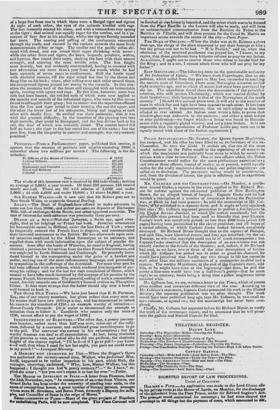POLICE Apron:len:yrs.—Mr. Swabey, the Queen Square Magistrate,
has resigned, and his office has been filled by an meSecretary of the ex- Chancellor,' So says the Globe. It strikes eft; that one of the most useful reforms in the Police would be the 801(1411M; of all matters in which the magistrate acts judicially from those in which he ex= amities with a view to'committal. One or two officers added; the Police.
Comniissioners eesuld suffice fur' the mere preliMifiary examinations;
and two or three officers, instead of twelve; as at present, would equally suffiee for •the really magisterial duties which our police meedstrates are called" en to discharge. The pecuniary saving would be eonsiderable, and, from -the division of labour, the gain in efficiency and in eipedition would be great: COLBURN AND HIS CossrninuTone.On Merida's.; a gentle- .men named Cooke, a captain in the army, applied to 'Sir Richard Bir- nie -far redresi against the celebrated publisher of New Burlington ;Street ,for an alleged breath of "bargaite Captain Cooke said he had :writtehe deSci'iption of a number of eencOntres during the Peninsular sear, at iehith be had been present he sold the'Menuscript itige."
tleirn;'eneptiblislied in a separate foiiii; end" it ' °via to hafrappi'areel.
/Met year i'Mr. Ceibitrit requested pert fission-to pufiish a,feri 4.trecte in :hie /NO Service Joioeiat, to whiCh to anther consentede.left the : perauSsuin thus granted bad been etsed "et) liberally that poor captain
Coeke's 'work was completely gutted, no less than 4000 lines (abut 150
pages) having, been journalized-by the clever: publisher, and hopes of a sepoed edition, to which Captain Cooke looked forward, completely destroyed. • Sir Richard Birnie thought that as the capture of Badajns, and such like, were historical events, and long ago deseribed—by the ex- Premier, to witthe copyright could not be of much consequence ; but - Captain Cooke obserVed that the description of an eye-witness was not.. miactly similar to the details of the Gazette; and, indeed, if Sir Richard" had read, as we have, two or three of the nine descriptions of battles which Mr..Collsern has picked out in order to grace his Journal, he *Mad $ikvelwiefiivept that hardly any two things in life less resemble- . each other than the Military narratives of a commander-in-thief and a captain,. The worthy Magistrate; atethieeed of,eltg Captain's etery, told him, aseba might have done at the beginniege4nt then,: he. and the peany-a-line-menwould have lost a helfehour'agossip—that he must apply to an attorney, books being a thing that a police magistrate never
meddled-With. , • .
Mr. Ceilbure has,. wesee, written a letter to the Times, rhich of course
gives another and somewhat different view of the case. According. to- Mr.,Cidburn's statement, Captain Cooke presented hie work to the United Service;. the. separate publication was an after thought. The work wonld haye been published long ago, says Sir. Colburn, in, two small oc- tave-volumes, as agreed on ; but the manuscript. has aeeer been come
pleted. . .
Colburn has appeared before Sir Richard Birnie, to verify the truth of the newspaper report, and to announce that he will proses
cuteeliekillant and learned Captain for libel. . .


























 Previous page
Previous page